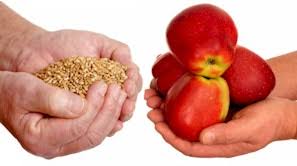Do you want BuboFlash to help you learning these things? Or do you want to add or correct something? Click here to log in or create user.
#globo-terraqueo-session #has-images #monetary-policy #money #reading-agustin-carsten


To understand the nature, role, and development of money in modern economies, it is useful to think about a world without money—where to purchase any good or service, an individual would have to “pay” with another good or service. An economy where such economic agents as households, corporations, and even governments pay for goods and services in this way is known as a barter economy .
If you want to change selection, open original toplevel document below and click on "Move attachment"
To understand the nature, role, and development of money in modern economies, it is useful to think about a world without money—where to purchase any good or service, an individual would have to “pay” with another good or service. An economy where such economic agents as households, corporations, and even governments pay for goods and services in this way is known as a barter economy . There are many drawbacks to such an economy. First, the exchange of goods for other goods (or services) would require both economic agents in the transaction to want what the other is s
To understand the nature, role, and development of money in modern economies, it is useful to think about a world without money—where to purchase any good or service, an individual would have to “pay” with another good or service. An economy where such economic agents as households, corporations, and even governments pay for goods and services in this way is known as a barter economy . There are many drawbacks to such an economy. First, the exchange of goods for other goods (or services) would require both economic agents in the transaction to want what the other is selling. This means that there has to be a double coincidence of wants . It might also be impossible to undertake transactions where the goods are indivisible—that is, where one agent wishes to buy a certain amount of another’s goods, but that agent only has one indivisible unit of another good that is worth more than the good that the agent is trying to buy. Another problem occurs if economic agents do not wish to exchange all of their goods on other goods and services. This may not be a problem, however, when the goods they have to sell can be stored safely so that they retain their value for the future. But if these goods are perishable, they will not be able to store value for their owner. Finally, in a barter economy, there are many measures of value: the price of oranges in terms of pears; of pears in terms of bread; of bread in terms of milk; or of milk in terms of oranges. A barter economy has no common measure of value that would make multiple transactions simple. 2.1.1. The Functions of Money The most generic definition of money is that it is any generally accepted medium of exchange. A medium of exchange is an
Parent (intermediate) annotation
Open itTo understand the nature, role, and development of money in modern economies, it is useful to think about a world without money—where to purchase any good or service, an individual would have to “pay” with another good or service. An economy where such economic agents as households, corporations, and even governments pay for goods and services in this way is known as a barter economy . There are many drawbacks to such an economy. First, the exchange of goods for other goods (or services) would require both economic agents in the transaction to want what the other is s
Original toplevel document
MoneyTo understand the nature, role, and development of money in modern economies, it is useful to think about a world without money—where to purchase any good or service, an individual would have to “pay” with another good or service. An economy where such economic agents as households, corporations, and even governments pay for goods and services in this way is known as a barter economy . There are many drawbacks to such an economy. First, the exchange of goods for other goods (or services) would require both economic agents in the transaction to want what the other is selling. This means that there has to be a double coincidence of wants . It might also be impossible to undertake transactions where the goods are indivisible—that is, where one agent wishes to buy a certain amount of another’s goods, but that agent only has one indivisible unit of another good that is worth more than the good that the agent is trying to buy. Another problem occurs if economic agents do not wish to exchange all of their goods on other goods and services. This may not be a problem, however, when the goods they have to sell can be stored safely so that they retain their value for the future. But if these goods are perishable, they will not be able to store value for their owner. Finally, in a barter economy, there are many measures of value: the price of oranges in terms of pears; of pears in terms of bread; of bread in terms of milk; or of milk in terms of oranges. A barter economy has no common measure of value that would make multiple transactions simple. 2.1.1. The Functions of Money The most generic definition of money is that it is any generally accepted medium of exchange. A medium of exchange is an
Summary
| status | not read | reprioritisations | ||
|---|---|---|---|---|
| last reprioritisation on | suggested re-reading day | |||
| started reading on | finished reading on |
Details
Discussion
Do you want to join discussion? Click here to log in or create user.